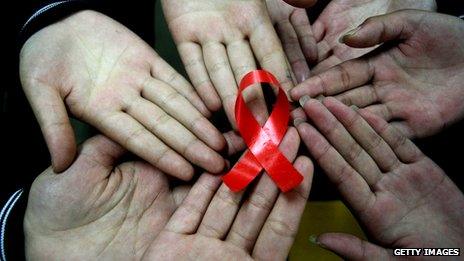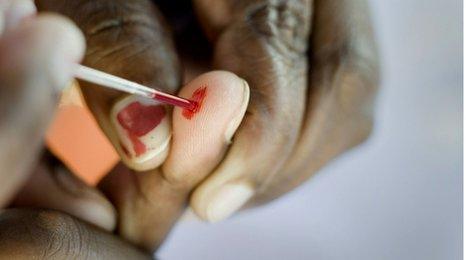Campaigners say the young don't know enough about HIV
- Published

Sexual health experts and leading HIV charities say not enough is being done to raise awareness of the dangers of the virus for young people.
It's claimed infection rates are still high and many people don't understand what it's like living with the illness.
Figures from the Health Protection Agency (HPA) show there were nearly 6,000 confirmed cases in adults across the UK in 2011.
In the last five years nearly 3,500 16 to 24-year-olds have been diagnosed.
Paul Steinberg is a sexual health expert based in Lambeth, south London.
He said: "I think it's a fair point to say awareness of HIV generally has dropped off the radar for a lot of people in this country."
Paul believes the medical advances made in treating HIV over the past decade have led to people becoming more complacent and taking more risks.
He also says the increased focus on other, more common, STIs like chlamydia and gonorrhea means young people aren't as educated as they should be on HIV.
"If someone is diagnosed with chlamydia then we can give them some antibiotics and they will be cured," he said.
"Although HIV is not a death sentence any more, if someone does get diagnosed it's a long-term, long-lasting condition.
"It's not the same as having chlamydia or gonorrhea which can be treated."
Infection myths
Sarah, which is not her real name, is 25 and was born with HIV.
She agrees there are too many young people who don't know enough about the virus.
She said: "I have some friends that were ignorant about it.
"Some people believe you can get it from kissing or even sharing a cup."
Sarah's been doing work with the charity Body and Soul, which has launched a campaign called Life In My Shoes to challenge people's misunderstandings of HIV.
The Department of Health recently announced £8m would be spent on raising awareness of HIV in England over the next three years.
The bulk of that money will be given to The Terrence Higgins Trust, one of the UK's leading sexual health charities.
Genevieve Edwards from the Trust agreed more work needed to be done.
She said: "There's a new generation who haven't had basic training.
"The government is funding us to target our campaigns for those most at risk, which are gay and black and African communities.
"However, it's true to say much more can be done for the population as a whole and generally young people."
- Published31 August 2011

- Published22 December 2010
